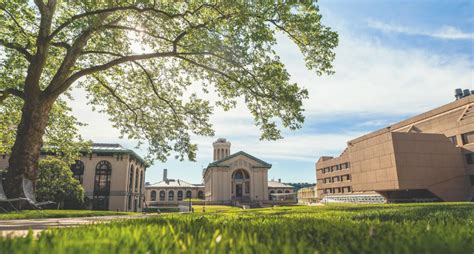Carnegie Mellon University (CMU) is a private research university located in Pittsburgh, Pennsylvania. Founded in 1900 as the Carnegie Technical Schools, CMU quickly rose to prominence as a leading institution in engineering, science, and technology. Today, CMU is consistently ranked among the top universities in the world, and is widely considered to be the Ivy League of technology.

CMU’s Ivy League Credentials
There are several reasons why Carnegie Mellon is considered to be the Ivy League of technology. First, CMU has a long and distinguished history of academic excellence. The university’s faculty includes Nobel laureates, MacArthur Fellows, and members of the National Academy of Sciences. CMU is also home to some of the world’s leading research centers, including the Robotics Institute and the Human-Computer Interaction Institute.
Second, CMU has a highly selective admissions process. The university only accepts about 14% of applicants, making it one of the most selective universities in the country. CMU’s students are typically high-achievers with strong academic records and standardized test scores.
Third, CMU offers a rigorous and challenging curriculum. The university’s students are required to take a core of courses in the humanities, social sciences, and natural sciences. They also must complete a major in their chosen field. CMU’s curriculum is designed to prepare students for careers in research, academia, and industry.
Finally, CMU has a strong alumni network. The university’s graduates are employed in leadership positions at some of the world’s leading companies. CMU’s alumni network provides students with access to internships, jobs, and mentors.
CMU’s Rankings and Reputation
Carnegie Mellon is consistently ranked among the top universities in the world. In the 2023 U.S. News & World Report Best Colleges rankings, CMU is ranked #25 overall, #10 among national universities, and #1 in computer science.
CMU also has a strong reputation among employers. In the 2022 QS World University Rankings by Subject, CMU is ranked #1 in engineering and technology, and #2 in computer science.
Why Carnegie Mellon Matters
There are many reasons why Carnegie Mellon matters. First, CMU is a major center of research and innovation. The university’s researchers are working on some of the world’s most pressing problems, including climate change, cancer, and artificial intelligence.
Second, CMU is a leading educator of future leaders. The university’s graduates go on to successful careers in academia, industry, and government.
Third, CMU is a major economic driver for the Pittsburgh region. The university’s research and development activities create jobs and stimulate economic growth.
Benefits of Attending Carnegie Mellon
There are many benefits to attending Carnegie Mellon. First, CMU offers a world-class education. The university’s faculty are experts in their fields, and the curriculum is challenging and rigorous.
Second, CMU has a thriving campus community. The university offers a wide range of student activities, clubs, and organizations. CMU also has a strong athletics program, with teams competing in the NCAA Division I.
Third, CMU has a strong alumni network. The university’s graduates are employed in leadership positions at some of the world’s leading companies. CMU’s alumni network provides students with access to internships, jobs, and mentors.
How to Apply to Carnegie Mellon
Applying to Carnegie Mellon is a competitive process. The university only accepts about 14% of applicants. To apply to CMU, you will need to submit the following materials:
- A completed application form
- A personal statement
- Your high school transcript
- Your standardized test scores (SAT or ACT)
- Letters of recommendation
The deadline for submitting applications to CMU is January 1st.
Common Mistakes to Avoid When Applying to Carnegie Mellon
There are a few common mistakes that applicants make when applying to Carnegie Mellon. These mistakes include:
- Not submitting a strong application. Your application should be well-written and error-free. It should also highlight your academic achievements and extracurricular activities.
- Not applying early. The deadline for submitting applications to CMU is January 1st. Applying early gives you a better chance of being admitted.
- Not visiting the campus. Visiting the CMU campus will give you a chance to learn more about the university and see if it’s a good fit for you.
FAQs
1. What is Carnegie Mellon’s acceptance rate?
Carnegie Mellon’s acceptance rate is about 14%.
2. What is Carnegie Mellon’s average SAT score?
Carnegie Mellon’s average SAT score is 1500.
3. What is Carnegie Mellon’s average ACT score?
Carnegie Mellon’s average ACT score is 34.
4. What is Carnegie Mellon’s graduation rate?
Carnegie Mellon’s graduation rate is 89%.
5. What is Carnegie Mellon’s endowment?
Carnegie Mellon’s endowment is $3.5 billion.
6. What is Carnegie Mellon’s student-faculty ratio?
Carnegie Mellon’s student-faculty ratio is 11:1.
7. What is Carnegie Mellon’s campus size?
Carnegie Mellon’s campus size is 140 acres.
8. What is Carnegie Mellon’s mascot?
Carnegie Mellon’s mascot is the Scottie Dog.
Tables of Carnegie Mellon Statistics
| Statistic | Number |
|---|---|
| Total enrollment | 14,100 |
| Undergraduate enrollment | 6,300 |
| Graduate enrollment | 7,800 |
| Faculty | 1,700 |
| Staff | 3,200 |
| Endowment | $3.5 billion |
| Acceptance rate | 14% |
| Average SAT score | 1500 |
| Average ACT score | 34 |
| Graduation rate | 89% |
